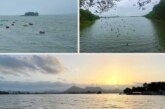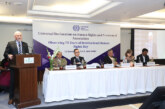STORY HIGHLIGHTS
- Population growth, economic expansion, and climate change are increasing the pressures on limited water supplies in cities around the world.
- A holistic approach is needed to help water scarce cities develop resilient strategies for long-term water security.
- The World Bank’s Water Scarce Cities Initiative is collaborating with partners to improve water management approaches, to establish a global network of practitioners and experts, and to facilitate technical assistance to build resilience against climate change.
 Cities house a growing number of the world’s population, and current estimates show that the future of humanity looks ever more urban. The demand for water grows by the day: a 50 percent increase in urban water demands is anticipated within the next 30 years.
Cities house a growing number of the world’s population, and current estimates show that the future of humanity looks ever more urban. The demand for water grows by the day: a 50 percent increase in urban water demands is anticipated within the next 30 years.
Hence, the need for securing an inclusive and sustainable water supply for cities is fairly obvious. Historically, a reliable source of safe water is intricately linked with inclusive economic growth, public health, and political stability. Given the key role played by water, it is imperative to ensure that water availability keeps up with the escalating water demands of expanding urban populations.
However, urban water scarcity remains a common reality. Many cities, regions, and countries around the world are faced with a trifecta of pressures: rapid urban population growth, economic expansion, and competing demands. These forces of change are tightening the availability of water resources in areas where tackling water scarcity is already a critical challenge.
In addition, other factors such as pollution, suboptimal water management practices, and climate change are also negatively impacting the health of urban water systems.
The task of securing and orchestrating a water supply for urban areas in water scarce regions is clearly no easy feat. But on the bright side, water scarce cities are not facing these challenges alone. Regions as diverse as the Middle East and North Africa, Central Asia, and parts of Latin America and North America are exploring new approaches for a water-smart future.
Water Scarce Cities
 The World Bank’s Water Scarce Cities (WSC) Initiative is an innovative undertaking that offers a holistic perspective to urban water security in scarcity conditions. With a host of experiences and extensive global reach, WSC is working towards shifting mindsets across the world, demystifying urban water management, and engaging with water scarce cities to develop concrete solutions.
The World Bank’s Water Scarce Cities (WSC) Initiative is an innovative undertaking that offers a holistic perspective to urban water security in scarcity conditions. With a host of experiences and extensive global reach, WSC is working towards shifting mindsets across the world, demystifying urban water management, and engaging with water scarce cities to develop concrete solutions.
By serving as a connecting thread between water stressed cities, WSC offers a new avenue for knowledge sharing on water success stories and challenges to spark breakthroughs in best practices. WSC also offers an integrated water approach that encapsulates political, social, and institutional dimensions. The initiative is structured around the following key objectives:
- Providing a toolbox and strategies for cities to support water resilience with knowledge products that highlight integrated water solutions.
- Creating stronger connections between water scarce cities and sharing solutions by providing a platform for practitioners and experts, as well as global thought leaders and institutions.
- Supporting water scarce cities with concrete engagement, including providing technical assistance for new water management approaches, technological advancements, and political practices.
From wastewater reuse to aquifer rehabilitation, below are some success stories that WSC is sharing among cities.
For example, Marrakech (Morocco) is rising above the challenge of urban water scarcity by diversifying its water resources portfolio, engaging in participatory groundwater management, and curbing its water demand by reducing leakages in its water networks.
In Orange County, California (USA), authorities have successfully reduced reliance on external water supplies by reusing wastewater, and using its aquifer as a safety net.
In Malta, a water-scarce island located in the Mediterranean, impressive efforts have been made to diversify water resources, including desalination of seawater and brackish groundwater and harvesting rainwater.
The City of Windhoek, Namibia is increasing water security through multiple approaches, including storing water for future use through careful aquifer management, and using direct reclamation of drinking water from domestic sewage effluent. In addition, Windhoek builds resilience against the stressors of a variable climate through regional water cooperation.
In the words of Steven Schonberger, World Bank Practice Manager for Water in the Middle-East and North Africa region, this WSC initiative is timely: “Water scarce cities around the world, in both high income and developing countries, are undertaking a paradigm shift in how policy, technology and management systems are applied to improve financial and ecological sustainability and social equity. This initiative brings together practitioners to learn from each other and accelerate the adoption of this new paradigm in all of the water stressed regions of the world.”
Previous work has demonstrated that water resilience may be enhanced with unconventional thinking that ventures beyond traditionally narrow and siloed approaches. The intrinsically global reach of WSC enables the initiative and its partners to leverage imaginative water solutions to the greatest effect and combine efforts to adopt new water solutions based on comprehensive resilience strategies and cross-sectoral learning. Looking at water resource challenges through a creative, cooperative, and collaborative lens creates an opportunity to foster innovations on water allocation and management practices across the globe.



